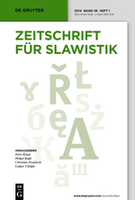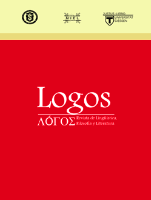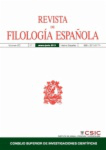
Philologica Canariensia
Scope & Guideline
Advancing interdisciplinary dialogue in literature and linguistics.
Introduction
Aims and Scopes
- Linguistic Analysis and Phonetics:
The journal emphasizes research in phonetics and phonology, exploring both historical and contemporary aspects of Spanish language. This includes clinical applications and theoretical explorations of phonetic structures. - Literary Studies and Interpretation:
A core focus is on literary analysis, encompassing both classical and modern texts. The journal seeks to interpret and contextualize literary works within their historical, cultural, and social frameworks. - Cultural and Societal Reflections:
Research that reflects on cultural phenomena, including migration, gender, and identity, is central to the journal's aims. This includes examining how literature interacts with societal issues. - Historical Linguistics and Lexicography:
The journal also covers topics related to the history of the Spanish language, including lexicographical studies, the evolution of language, and the socio-cultural implications of linguistic changes. - Interdisciplinary Approaches:
Philologica Canariensia encourages interdisciplinary research that combines literary theory, linguistic analysis, and cultural studies, fostering a broader understanding of the Spanish-speaking world.
Trending and Emerging
- Migration and Identity in Literature:
There is a notable increase in research addressing the themes of migration and identity, reflecting the global discourse on these issues. This trend highlights how literature serves as a lens to examine the complexities of cultural and personal identity in the context of migration. - Intertextuality and Cultural Hybridization:
Emerging studies are increasingly focusing on intertextuality and cultural hybridization, exploring how texts shape and are shaped by cultural exchanges. This interest underscores the interconnectedness of literary traditions across different cultures. - Gender Studies and Representation:
The journal has seen a rise in articles analyzing gender dynamics and representation in literature, indicating a growing awareness of feminist theories and the role of gender in cultural narratives. - Pragmatics and Sociolinguistics:
Research employing pragmatics and sociolinguistics to analyze language use in specific communities, such as the impact of reggaeton on cultural discourse, is gaining traction, reflecting a broader interest in how language functions in social contexts. - Digital Humanities Approaches:
There is an emerging trend towards incorporating digital humanities methodologies in literary and linguistic research, suggesting a shift towards utilizing technology to analyze texts and language patterns.
Declining or Waning
- Traditional Historical Narratives:
Research focused solely on traditional historical narratives and their literary representations has seen a decline. This suggests a shift towards more contemporary issues and critical approaches that engage with modern contexts. - Static Linguistic Structures:
Studies that focus on static aspects of linguistic structures, without considering their dynamic and contextual applications, appear to be decreasing. There is a growing preference for research that addresses language in use and its sociocultural implications. - Narrowly Defined Genres:
The exploration of narrowly defined literary genres, particularly those with limited cultural relevance, has become less frequent. The journal seems to favor broader, more integrative approaches that consider cross-genre influences. - Historical Lexicography:
While lexicography remains a relevant topic, studies focused exclusively on historical lexicography without connecting to contemporary language use are diminishing, indicating a trend towards practical applications of lexicographic research.
Similar Journals

Caplletra
Advancing Open Access Scholarship in LinguisticsCaplletra is a distinguished open-access journal dedicated to the field of linguistics and language studies, published by PUBL ABADIA MONTSERRAT since its inception. Based in Barcelona, Spain, this journal has been a vital resource for researchers, professionals, and students engaged in the intricate explorations of language and its applications since its transition to open access in 2005. Despite its current quartile ranking of Q4 within the Linguistics and Language category as of 2023, Caplletra continues to serve as an inclusive platform, fostering a dialogue that encourages a diverse range of scholarly contributions. Covering an expansive scope in the converged years from 2018 to 2024, it plays a crucial role in disseminating innovative research and insights. With its ISSN 0214-8188 and E-ISSN 2386-7159, Caplletra is committed to making academic work accessible to all, enhancing the landscape of linguistic scholarship and reflecting the evolving nature of language studies.

Revista de Investigacion Linguistica
Exploring the depths of language and its myriad forms.Revista de Investigacion Linguistica is a distinguished open-access journal dedicated to the exploration and advancement of linguistic research, published by the University of Murcia since its inception in 1997. With the ISSN 1139-1146 and E-ISSN 1989-4554, this journal serves as a vital resource for linguistics scholars and enthusiasts around the globe. Located in the vibrant city of Murcia, Spain, the journal aims to foster academic discourse by disseminating high-quality research that covers a broad spectrum of linguistic topics, including syntax, semantics, phonetics, and sociolinguistics. Its commitment to open access ensures that knowledge is freely available, promoting a wider reach and impact in the academic community. By contributing to the advancement of linguistic studies, the Revista de Investigacion Linguistica plays a crucial role in shaping contemporary linguistic theories and practices, making it an essential publication for researchers, professionals, and students alike.

ZEITSCHRIFT FUR SLAWISTIK
Fostering Cross-Disciplinary Dialogue in Slavic ResearchZEITSCHRIFT FUR SLAWISTIK, published by WALTER DE GRUYTER GMBH, is a renowned journal focusing on Slavic studies, encompassing various fields such as cultural studies, linguistics, and literary theory. With its ISSN 0044-3506, this distinguished journal has been a significant contribution to the academic community since its inception in 1956, continuing to disseminate valuable research until 2024. While maintaining a strong reputation within several academic categories, ZEITSCHRIFT FUR SLAWISTIK holds a Q3 ranking in Cultural Studies and Linguistics and Language, and a Q2 ranking in Literature and Literary Theory as of 2023. This positioning underscores the journal’s impact, particularly as it caters to an audience of researchers, professionals, and students invested in the rich tapestry of Slavic culture and language. Access to this journal is not open; however, its comprehensive articles are crucial for anyone aiming to explore and deepen their understanding of Slavic linguistic and literary traditions. The journal's work is essential in fostering cross-disciplinary dialogue and advancing scholarship in these vital areas.

Logos-Revista de Linguistica Filosofia y Literatura
Bridging Linguistics, Philosophy, and Literature for a Richer UnderstandingLogos-Revista de Linguistica Filosofia y Literatura, published by UNIV SERENA, FAC HUMANIDADES in Chile, stands as a distinguished academic journal dedicated to the fields of linguistics, philosophy, and literature. With an ISSN of 0716-7520 and an E-ISSN of 0719-3262, this Open Access journal has been facilitating the dissemination of innovative research since 2012. Notably recognized within the Q2 category for Linguistics and Language, the Q1 category for Literature and Literary Theory, and another Q2 in Philosophy for 2023, it reflects a robust commitment to intellectual rigor and scholarly impact. The journal's rankings in Scopus highlight its significance in the Arts and Humanities' landscape, with impressive percentiles in multiple categories, affirming its vital role in advancing academic discourse. Serving as a crucial platform for researchers, professionals, and students, Logos encourages interdisciplinary dialogue and exploration, thereby enriching the understanding of language, thought, and narrative. The publication's convergence of diverse academic traditions and progressive themes positions it as a pivotal resource for contemporary scholarship.

REVISTA DE FILOLOGIA ESPANOLA
Pioneering Discoveries in the Art of Language and LiteratureREVISTA DE FILOLOGIA ESPANOLA is a distinguished academic journal dedicated to the fields of linguistics and literature, published by the CONSEJO SUPERIOR INVESTIGACIONES CIENTIFICAS (CSIC) since 1954, and has been an Open Access journal since its inception. Situated in Madrid, Spain, this journal has emerged as a crucial platform for the dissemination of scholarly research, with notable rankings including Q2 in Linguistics and Language and Q1 in Literature and Literary Theory as of 2023. The journal's commitment to fostering academic dialogue is reflected in its impressive Scopus rankings, including a 79th percentile in the Arts and Humanities for Literature and Literary Theory. Covering a wide range of topics from linguistic theory to literary critique, REVISTA DE FILOLOGIA ESPANOLA is essential reading for researchers, professionals, and students alike, providing valuable insights and cutting-edge research in the ever-evolving landscape of Spanish philology.

Alicante Journal of English Studies-Revista Alicantina de Estudios Ingleses
Shaping the Future of English Studies TogetherAlicante Journal of English Studies - Revista Alicantina de Estudios Ingleses, published by the esteemed University of Alicante since 2003, is a vital platform for researchers and scholars in the fields of Cultural Studies, Linguistics and Language, and Literature and Literary Theory. With an impressive impact factor reflected by its Q1 and Q2 rankings across various categories in 2023, the journal consistently delivers high-quality peer-reviewed articles that push the boundaries of knowledge and discourse in English studies. Operating under an Open Access model, it ensures that research is freely accessible to a global audience, thereby fostering collaboration and advancement within the academic community. The journal's commitment to excellence is further underscored by its Scopus rankings, which place it in the top percentiles of literature and cultural studies. Its scope for the converged years from 2019 to 2024 promises continued relevance and innovation, making it an essential resource for professionals, researchers, and students alike who seek to deepen their understanding of English studies.

Cadernos de Letras da UFF
Innovating Literary Studies with Open Access ScholarshipCadernos de Letras da UFF is a prominent academic journal published by the Department of History at the Federal University of Fluminense in Brazil. Since its transition to Open Access in 2014, it has fostered a spirit of collaboration and dissemination in the field of Literature and Linguistics, welcoming contributions that explore various aspects of literary studies, historical literature contexts, and linguistic phenomena. With a commitment to quality and academic rigor, the journal serves as a vital resource for scholars, practitioners, and students engaged in the humanities. The journal is dedicated to the advancement of knowledge through innovative research and critical analyses, making it an essential platform for sharing ideas with a global audience. The journal is based in Niterói, RJ, Brazil, and is indexed in various academic databases, enhancing its visibility and impact within the scholarly community.

Jordan Journal of Modern Languages & Literature
Showcasing Excellence in Language and Literary ResearchJordan Journal of Modern Languages & Literature is a prestigious academic journal published by Yarmouk University, Deanship of Research & Graduate Studies. This journal serves as a vital platform for scholars and researchers in the fields of linguistics and literature, offering a well-rounded examination of modern languages and literary theory. With an impressive Q2 ranking in Linguistics and Language and a Q1 distinction in Literature and Literary Theory as of 2023, it consistently features high-quality research that contributes to the advancement of knowledge in these domains. The Scopus rankings further reflect its academic rigor, placing it in the 79th percentile for Literature and Literary Theory and maintaining significant influence in related fields, making it an essential resource for researchers, professionals, and students alike. Although it does not operate under an open-access model, the journal's commitment to publishing groundbreaking studies can significantly aid in the understanding and progression of modern linguistic and literary practices. The Jordan Journal of Modern Languages & Literature continues to be an influential voice in fostering scholarly dialogue and advancing research in the humanities.

LINGUA E STILE
Unveiling the Depths of Linguistic and Philosophical InsightsLINGUA E STILE, published by SOC ED IL MULINO, is a distinguished academic journal based in Italy that delves into the intricate realms of linguistics, literature, and philosophy. With an ISSN of 0024-385X, this journal has been a vital platform for scholarly discourse since its inception, covering a broad spectrum of topics from linguistic theory to literary analysis. Although it currently holds a Q4 category ranking in 2023 across multiple disciplines—specifically in Linguistics and Language, Literature and Literary Theory, and Philosophy—it remains committed to fostering insightful contributions that challenge and expand conventional understanding in these fields. While it does not offer open access, the journal diligently focuses on publishing high-quality research that appeals to academics, professionals, and students alike. With the convergence of multi-disciplinary approaches, LINGUA E STILE is positioned to engage with contemporary debates and developments, enriching the academic landscape from its base in Bologna, Italy, and inviting contributions that exemplify the evolving intersections of language and thought.

Vestnik Sankt-Peterburgskogo Universiteta-Yazyk i Literatura
Fostering Critical Insights in Linguistics and LiteratureVestnik Sankt-Peterburgskogo Universiteta-Yazyk i Literatura, published by ST PETERSBURG UNIV PRESS, stands as a pivotal academic journal in the fields of linguistics and literature, reflecting a profound commitment to the exploration of language and literary theory. With an ISSN of 2541-9358, this journal has steadily built its reputation since its inception in 2017, achieving impressive rankings in Scopus that place it within the top tiers of its categories—Q2 in Linguistics and Language and Q1 in Literature and Literary Theory as of 2023. The journal serves as an essential platform for researchers, professionals, and students who are keen to delve into the complex interactions between language and literature. Although currently not offering Open Access, its contributions are invaluable to advancing scholarly dialogue and fostering understanding within these vibrant fields. With a converged publication timeline extending through 2024, Vestnik Sankt-Peterburgskogo Universiteta-Yazyk i Literatura exemplifies the ongoing commitment to high-quality research and critical thought, making it an indispensable resource for those dedicated to the study of language and its literary manifestations.